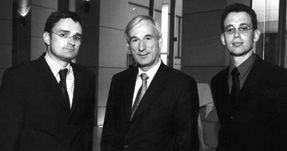
German Federal Foreign Office State Secretary and former Burns patron Jürgen Chrobog with the winners of the 2003 German-American Commentary Award: Stefan Kornelius (left) and Clemens Wergin (2003 Burns Alumnus)

German Federal Foreign Office State Secretary and former Burns patron Jürgen Chrobog with the winners of the 2003 German-American Commentary Award: Stefan Kornelius (left) and Clemens Wergin (2003 Burns Alumnus)
Both authors received the EURO 1,000 prize from Germany's foreign minister at the annual Burns dinner and lecture on May 7 in Berlin. Each year, this award goes to one American and one German Burns alum for outstanding journalistic work in regards to the political, economic or cultural situation in each other's country, or to the transatlantic relationship in general.
New York-based Zeitchik (2003) published his engaging article on Germany's trend toward "Ostalgie" (the concept of East Germany's nostalgia for the times prior to the fall of the Berlin Wall) in the International Herald Tribune on Oct. 7, 2003. His conclusion was that Germany is together, but hardly unified.
Kammerer's (2002) two-part article about the tragic crash of the space shuttle "Columbia" was published in Stern magazine last year. She meticulously reconstructed the last days before the catastrophe in the control center and in space. She not only tells the story of the space shuttle's crash, but also analyzes the burst of an American utopia.
Sascha Lehnartz (2003) received an honorable mention for "Wie ein staunendes Tier (Like an astonished animal)," a sensitive portrait of New Orleans-based businessman Clay Shaw, whose life was ruined 40 years ago after he was wrongfully named as the main suspect in the assassination of U.S. President John F. Kennedy.
The other honorable mention was awarded to Sigrid Aufterbeck (2003), who reported on her personal impressions and observations at an emotional funeral of a 20-year-old U.S. soldier who died in Iraq.
The 1,000 Euro German-American Commentary Award was split between two German journalists this year.
In "Die Kunst der Kriegsvermeidung (The art of avoiding war)," Stefan Kornelius, foreign politics desk editor at Süddeutsche Zeitung, wrote about the pros and cons of military intervention by allied troops in Iraq in his editorial on Feb. 8, 2003. Carefully avoiding clichés and bias, Kornelius tried to explain the failure of political negotiations prior to the war by using strategic hindsight and eloquence, using examples of Chinese philosopher and military tactician Sun Tzu.
Kornelius shared the prize with Clemens Wergin (2003), opinion page editor of Tagesspiegel. Wergin was not awarded for one article, but for more than 20 editorials about the transatlantic relationship during his Burns Fellowship for his host, the Chicago Tribune, and for his German publication. The jury rewarded Wergin for his editorial bilingual writing skills and the ability to work with in two languages with two editorial boards simultaneously.
2006 Burns Award Winners
2005 Burns Award Winners
2004 Burns Award Winners
2002 Burns Award Winners